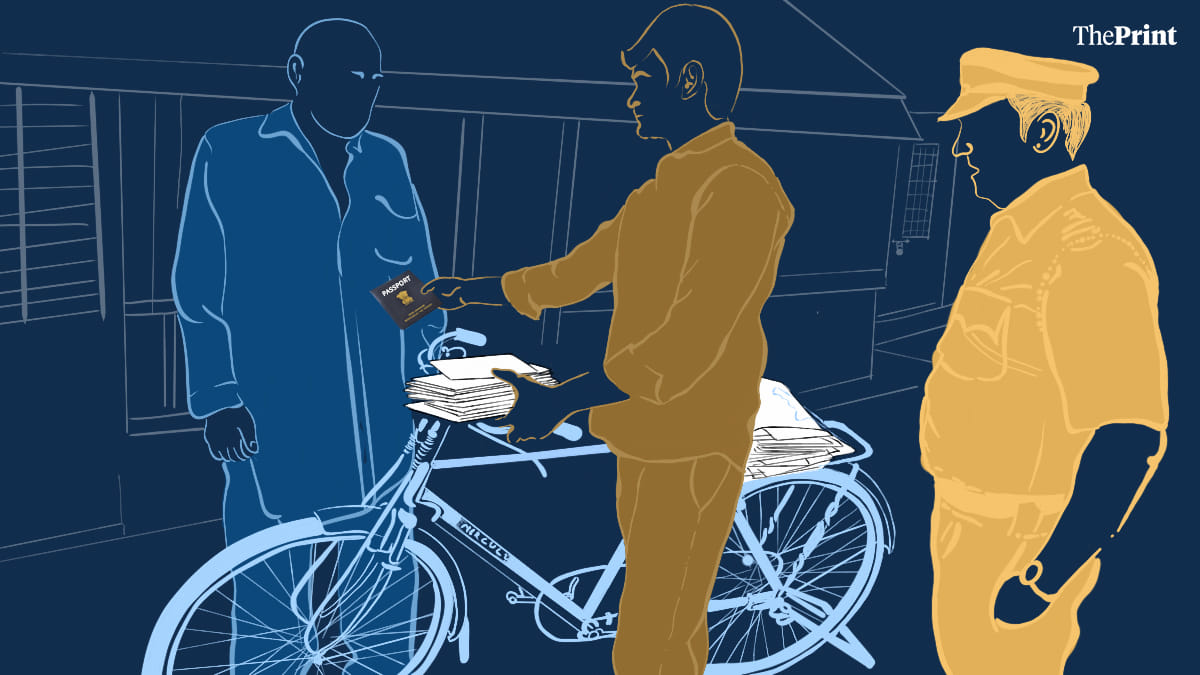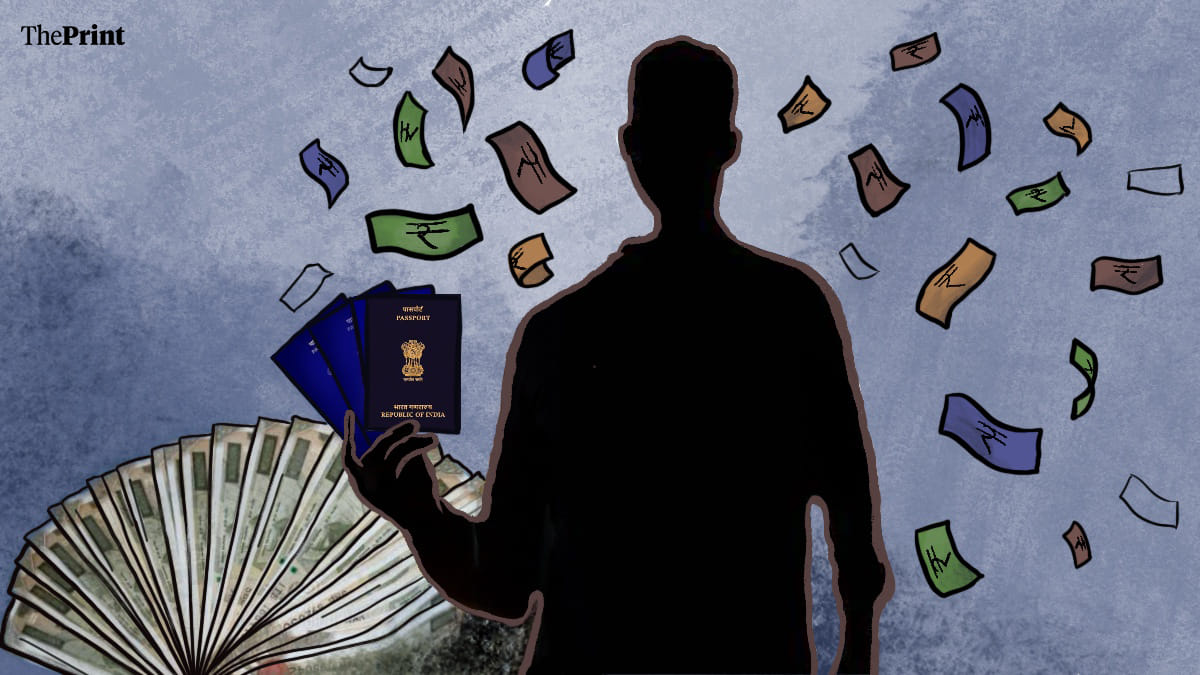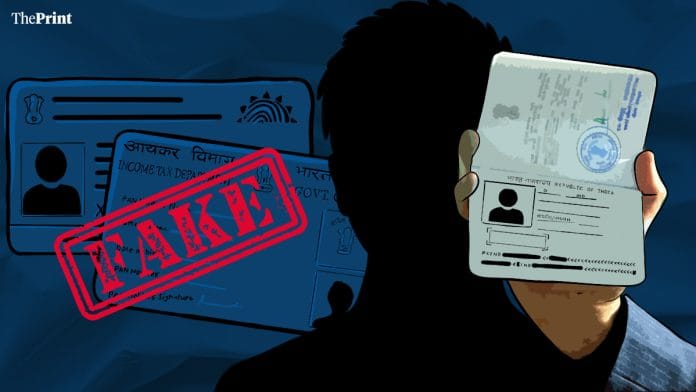New Delhi: Last year, a double murder case related to gang rivalry stumped the Delhi Police after the main accused, Harsh alias Chintu, vanished into thin air.
The shootout took place at a salon in Najafgarh on 9 February 2024. Chintu, a member of the Gogi gang, an ally of the Lawrence Bishnoi gang, was allegedly the main shooter. Two rival gang members perished. And Chintu was not to be seen again.
The case remained in cold storage for months, until the Delhi Police got intel that Chintu had fled from Amritsar to Dubai, and was most likely in Baku. Armed with this crumb of a tip-off, they began to scour three months of records of air passengers who had travelled this route.
The police knew a Look Out Circular in this case would be pointless as he had most likely fled the country under a false identity. They made countless calls to passengers to figure out if one of them could be their man, but without success. Until one person stood out as suspicious.
This passenger was Pradeep Kumar. A police team visited his Jalandhar address, but found no one by the name. The contact number provided by the airline was unreachable as well.
What really set off alarm bells was the information that his passport was issued on 26 March 2024, just weeks after the Najafgarh double murder, under the tatkal scheme.
The Delhi Police then issued a Look Out Circular in the name of Pradeep Kumar. In November, he landed at the Indira Gandhi International Airport, and was immediately taken into custody. The detainee was indeed their man, Chintu. He had changed his appearance, but matched the photo the police had.
Here’s the kicker: Chintu’s passport wasn’t technically fake. He had even provided his own biometrics. But the documents he submitted as identity proof—Aadhaar, voter ID, even a Punjab National Bank passbook—had fake addresses, phone numbers, all under the name Pradeep Kumar, but with his own photograph.
In a nutshell, this Pradeep Kumar, didn’t exist.
That’s how easily Chintu, who is facing multiple cases of extortion and even a double murder charge, escaped the country.
It’s not just wanted gangsters. According to police sources, this modus operandi is used by illegal immigrants from other countries to enter and leave India, Indians looking to migrate illegally, even fraudsters trying to extend their stay abroad after flying out on tourist visas.
While the government and law enforcement agencies simplify and ease systems for citizens to get passports, these offenders are constantly updating, upgrading and changing their modus operandi to escape getting caught. And they often succeed.
Fake documents, multiple identities, multiple passports under different names, misuse of the tatkal service are some of the ways they are doing it and getting away.
Any detections are sheer luck. “The government collects passport and Aadhaar data. But there is no integration and hardly any checks at immigration to detect irregularities unless someone has been flagged or identified due to their accent, disguise, or evidently forged or tampered documents. Even with access to the centralised system, 99 percent of the time, criminals bypass all checks,” a senior police officer said.
This is happening due to a combination of factors—not enough checks and balances, loopholes in the system, laxity, complicit officials, forgery. Whether the passports have been attained via tatkal or the regular way, one factor is common—fake/different identities. Some may be stolen, some may be bought, some entirely made up by a rogue agent.
Despite efforts by Indian investigating agencies to launch crackdowns on such rackets, they fall short when it comes to uprooting the syndicates involved. In their operation against passport rackets, the IGI unit of the Delhi Police last year arrested 23 agents for supplying people with fake documents and arranging passports. Twenty-one of these were Indians. Additionally, 19 foreign nationals—who had either returned to India or tried to flee the country using passports made with forged documents—were arrested.
In another operation, the Crime Branch unit of Delhi police earlier this week busted a fake passport racket and seized at least six such passports. Seven individuals have been arrested in the case to date, including a gangster, Monu alias Aryan, from the Neeraj Bawana gang, and Harpal Singh, a former Punjab police constable and history-sheeter.
Tracking these agents is a continuous endeavour with raids and arrests. However, the number of arrests remains minimal compared to the magnitude of the problem as the majority manage to evade detection by exploiting systemic loopholes.
“There are arrests and the data fails to paint the true extent of the issue since there are multiple stakeholders involved. Those getting caught mostly are the ones who have tampered passports, trying to flee the country, or there was stricter vigilance on their arrival from abroad,” a senior police officer said.
Gaps in the system
In a 2017 answer to a question asked in the Rajya Sabha, the government had stated that the Ministry of External Affairs (MEA) has integrated the Passport Seva System with the Aadhaar database since August 2015 and has been utilising Aadhaar-based biometrics for issuance of passports.
If someone applies for a passport using their Aadhaar—one of the common documents used in passport applications—the Aadhaar number of the applicant and biometrics are validated with the Aadhaar database for verification.
The Unique Identification Authority of India (UIDAI) does not share Aadhaar photographs with passport authorities.

Investigators probing such cases mainly point to lacunae in the system, and the lack of integration in terms of biometrics, between different databases like passport and Aadhaar.
As a result, sources in the security establishment say, their reach is limited in such cases. In most cases, they have to wait for such criminals to get deported from a foreign country, depend on immigration officials to identify them at airports, and extradition requests to come through.
Ease of deception with tatkal
While applying for a passport, be it the regular way, or by tatkal, key documents the applicant needs to submit are address proof, identity proof, and proof of date of birth.
While a regular passport is issued after police verification, under the tatkal scheme—which enables the applicant to get a passport in just 3-5 days—police verification is conducted after issuance.
According to sources in the Delhi Police, Chintu applied for a tatkal passport through an agent, identified as Chetan Goyal. He submitted an Aadhaar card, a voter ID and a Punjab National Bank passbook, all forged under the name of Pradeep Kumar.
Not just Chintu, gangsters like Sachin Thappan and Anmol Bishnoi too are suspected to have left the country on tatkal passports after the high-profile murder of Punjabi singer Sidhu Moosewala in May 2022. Fugitive gangster Rohit Godara had also fled the country using the same method, allegedly under the name of Pawan Kumar.
“These documents are provided by agents. They photoshop the names and put photos of Chintu wherever required. He then gave his own biometrics for issuance of the passport,” a Delhi police source said.
By the time investigating agencies flagged this to the Regional Passport Office, Chintu was already outside the country. According to Indian government officials, once a passport issued through tatkal is flagged by agencies or fails police verification, it takes 60-90 days for the passport to be impounded.
“A notice is issued and a 30-day time period is given to the concerned individual to respond. If no response is received, and no contact is established with the individual, the process of impounding the passport is started. This gives them enough time to go from one country to another and become untraceable,” said a Delhi police officer.
Sources in the Ministry of External Affairs (MEA) however said the 30-day time period is necessary protocol as they have to give the person time to respond as sometimes, they may not be at home, or their contact number is not reachable as they are abroad.
Deception in regular passport issuance too
Even the regular passport application process, though put in place for the ease of the public, is routinely exploited by criminals and agents.
For example, in January 2023, gangster Deepak Pahal alias Boxer fled India on a regular passport. He is alleged to have paid Rs 18,000 as bribe to a UP police constable to clear his documents issued under the name of Antil Ravi from Bareilly. Investigation later revealed that no such Antil Ravi existed.
“In some cases, they rent out a tiny room in the given address and get a rent agreement made. They even bribe post office personnel to deliver them the passport at a different address. In some cases, they bribe police personnel too and just do a video call for verification,” said a source in the security establishment.
Also Read: India drops 5 spots in Henley Passport Index to 85, lowest ranking since 2021
‘Too well-forged’
According to investigators, multiple stakeholders are involved in acquiring fake documents. These include travel agents, Aadhaar and PAN card agents, photocopy shop owners, post office staff, former employees of government offices and even police personnel. Agents hoard forged Aadhaar and PAN cards, or stolen or bought ID and address proof such as bank passbooks or electricity bills.
Sources in the government pointed to the main issue being in the system of document verification.
“There is no way to detect them because they are so well forged. Original Aadhaar and PAN cards are used under a new identity. Most times, there is no previous official record of the person under their original identity to verify,” an RPO official said on condition of anonymity.
The official added: “Take the case of the illegal immigrants from Bangladesh and Myanmar. They have used their actual photograph and biometrics from the beginning in most cases for obtaining voter, Aadhaar or PAN cards. Others use original Aadhaar cards but change the name and photograph. The RPO office is primarily dependent on the first two steps for issuance of the passports.”
One can now upload Aadhaar and other documents on the Digilocker platform but that is just to ensure that the verification process is paper-free and smooth. It cannot detect or prevent use of fake documents for passports.
“There is no system in place to compare and double-check Aadhaar biometrics with the passport data. The data for both Aadhaar and passport is held in separate databases,” another RPO official said.
According to the UIDAI website, it is barred from revealing personal information in the Aadhaar database, except on the orders of a high court, or the order of a secretary, in case of national security.
Getting away with multiple passports
Last August, one Satish Kumar Tiwari, a resident of Gorakhpur, landed in Delhi’s IGI airport after being deported from Thailand. His fingerprint scans at the airport in Bangkok had thrown up two matches with two Indian nationals who had entered Thailand previously—‘Satish Tiwari’ and ‘Shateesh Kumar’. Both had different dates of birth.
An investigation conducted by the IGI police, after Tiwari landed here, revealed he had travelled to Thailand on his original passport in 2016. He had to return after being blacklisted for overstaying.
In 2018, he got another passport as ‘Satish Tiwari’ after an agent, Manoj Jaisal, forged his Aadhaar, PAN card details and tweaked his name (dropped the ‘Kumar’) and date of birth. However, Tiwari was blacklisted once again by Thailand, again, for overstaying after his visa expired.
His agent then changed his name to ‘Shateesh’, again changing his date of birth. He travelled to Thailand again, and returned to India in February 2024, landing in Kolkata. He later surrendered his two passports, one in Lucknow and another Kolkata to avoid detection.
Then again, in July 2024, the same agent got him another passport. This time under his real name—Satish Kumar Tiwari. He got caught because the first record of his passport was detected in Thailand, and he was deported to India.
In 2016, the Ministry of Home Affairs (MHA) had, in response to a Lok Sabha question, stated that: “The Bureau of Immigration has integrated Passport Related Information Data Exchange (PRIDE) database of the Ministry of External Affairs with Immigration Control System, which helps in detecting fake/forged Indian passports at immigration counters on a real-time basis and strict legal action as per law is taken against persons found involved in forgery of passports.”
However, an RPO official admitted to ThePrint: “Once a person applies for a passport, we can check if a passport has earlier been issued to their name. We do this by putting in their name. For instance, if their first name is Priya, all the people with this name who have been issued passports will crop up, along with their addresses. Currently, we can’t check or compare their biometric details. If they have changed their name and travelled under a disguise, they could bypass the system.”
Government sources said that under the Passport Seva Programme V2.0, there is likelihood that they will start attempting to match biometrics data collected in their own database.
Under this project, a “state-of-art digital ecosystem, process overhauling and integration among various stakeholders and databases” will be set up for security.
“There would be strict access controls across the system, incorporating biometrics,” the MEA had said in January 2022.
Passport Seva Programme V2.0 is already functional in Bhubaneshwar and Nagpur. This envisages rolling out of microchip-embedded e-passports with biometric and biographic information of the passport holder.
Business of new & stolen identities
When those seeking to immigrate illegally approach agents, the latter tell them which countries are viable options with respect to security checks at airports, borders and deportations. Investigators call this an “organised multi-layered and well-oiled nexus operating through the dark web”.
Mule account holders play a big role in this passport scam. These individuals sell their information like phone numbers, dates of birth and addresses to rogue agents. Their details are used to conjure up fictitious identities, and even stolen identities are used, simply by procuring an electricity bill without the owner’s knowledge.

For instance, seven passports were seized from agent Mehfooz Khan, who helped gangster Deepak Pahal alias Boxer.
“Khan was working with another person who ran a photocopy shop which, of course, had scanners and printers. He had access to original documents. He would edit the address, name and date of birth. Khan then used these documents to procure passports. They would do this through Passport Seva Kendras that are cut off from main cities or areas, and where they could strike a deal with the local police or someone in the passport office or in the post office,” a police source explained.
Sources said forged Aadhaar cards cost as little as Rs 160 and bank account details are also sold off at Rs 10,000 and more. The cost for arranging a passport on the basis of such forged documents ranges from Rs 1.50 lakh to Rs 3 lakh, depending on the urgency. There is an additional charge for flights or “donkey routes”.
In the case of illegal immigrants, investigators said that in most cases, all documents are forged. Agents from Delhi, Haryana, Punjab, Rajasthan, Gujarat, West Bengal etc. have been found to be working together. The end result is—a completely new identity, with fake documents, fake names, but original biometrics and photographs.
“The system is so flawed and corrupt that one person can have multiple Aadhaars based on two different addresses. UIDAI rejects multiple enrolments but agents often bypass this by using prints of different fingers during the capturing process. Until these issues are not addressed, the problem of fake passports cannot be tackled,” another police source said.
It’s all an identity game
The central government does maintain records of people caught attempting to get passports made using forged or fake documents. These cases are investigated by local police, crime branch or other specialised units.
These individuals may face criminal charges under the Bharatiya Nyaya Sanhita on charges of cheating and forgery, and the Passports Act.
Furthermore, the individual’s data may be flagged, and they could face a ban on future issuance of passports. In some cases, they might be added to watchlists shared across government agencies.
The Passport Seva Kendra (PSK) and other associated agencies maintain digital records of rejected applications due to fraud, which could also be shared with other authorities or referenced in future screenings.
The catch is that most crooks now beat this system using multiple identities. They rarely use the same identity, so even if they have been flagged in previous instances, they can still game the system.
While many government departments also maintain databases of vital records like birth certificates, ration cards, etc., the lack of real-time data sharing or proper coordination between departments lead to situations where false documents may go unnoticed.
Authorities may not always cross-check the authenticity of the submitted documents with the issuing authorities, leaving room for forged documents to slip through.
“This business is only growing over time and syndicates are constantly finding new ways to exploit the systemic loopholes. Agents make bail and they do it again. With this they become experts in cheating the system and become more and more careful over time. Everyone who is part of the system is responsible here and the menace won’t stop till whosoever part of it either due to negligence or is complicit, is held accountable,” a police source told ThePrint.
(Edited by Gitanjali Das)






